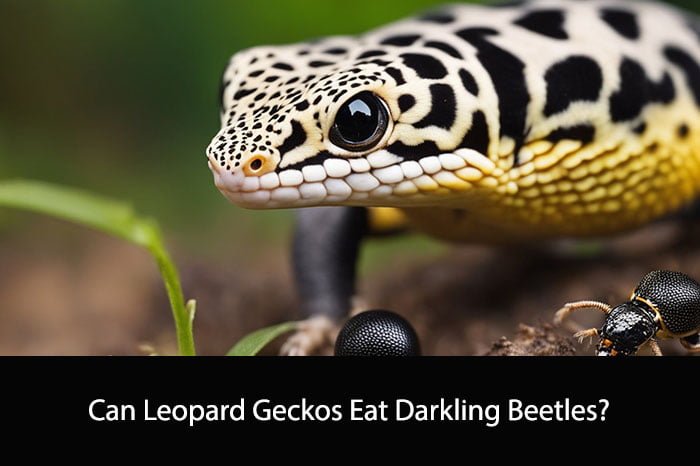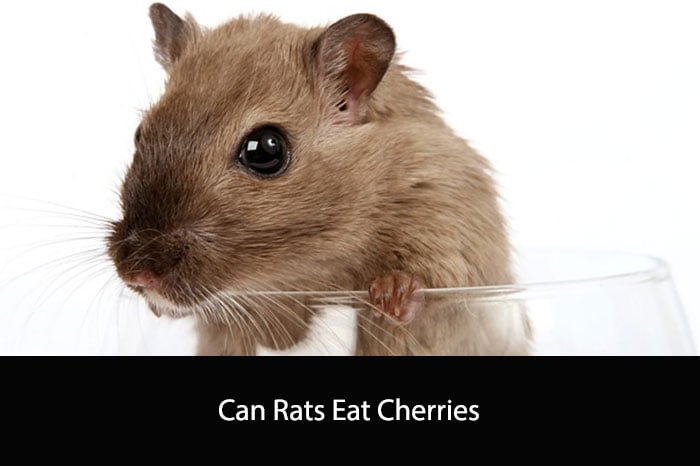Leopard geckos are popular pets among reptile enthusiasts due to their docile nature and unique appearance. As with any pet, it’s important to ensure that they are receiving a balanced and nutritious diet. One question that often arises among leopard gecko owners is whether or not they can eat darkling beetles.
Darkling beetles, also known as mealworm beetles, are a common feeder insect for many reptiles. They are easy to obtain and provide a good source of protein for your leopard gecko. However, it’s important to understand the potential risks associated with feeding your gecko darkling beetles. In this article, we will explore whether or not it is safe for leopard geckos to consume darkling beetles and what precautions you should take if you choose to feed them to your pet.
Leopard Gecko Dietary Basics
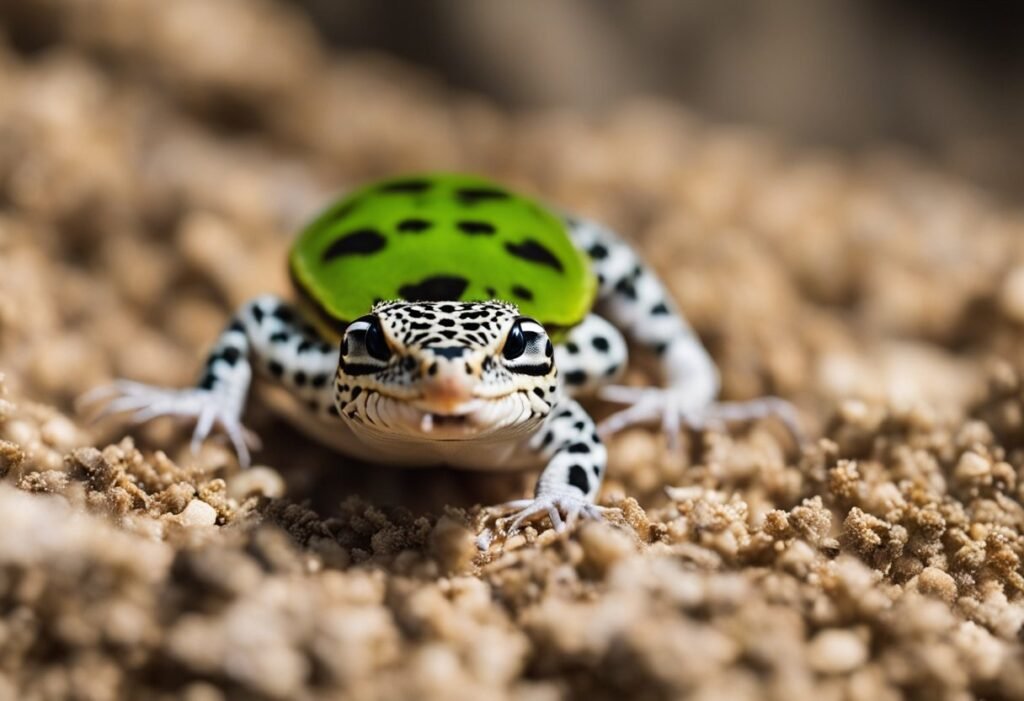
As responsible pet owners, it’s important to understand the dietary needs of our leopard geckos. In the wild, they primarily feed on insects, so it’s important to replicate this diet in captivity.
Leopard geckos are insectivores, meaning they require a diet consisting of insects. Some of the commonly fed insects include crickets, mealworms, waxworms, and superworms. It’s important to note that insects should be gut-loaded before feeding to provide additional nutrients to your leopard gecko.
In addition to insects, it’s important to provide your leopard gecko with a calcium supplement to prevent calcium deficiency and metabolic bone disease. Calcium powder should be dusted onto the insects before feeding.
When it comes to feeding darkling beetles to leopard geckos, it’s important to note that they can be fed in moderation. Darkling beetles are high in protein and low in fat, making them a good addition to your leopard gecko’s diet. However, they should not be the primary source of food as they lack certain nutrients that are essential for leopard geckos. It’s important to provide a variety of insects to ensure a balanced diet for your leopard gecko.
Overall, understanding the dietary basics of leopard geckos is crucial for their health and well-being. By providing a balanced diet consisting of insects and calcium supplements, you can ensure a long and healthy life for your leopard gecko.
Benefits of Darkling Beetles in a Leopard Gecko’s Diet
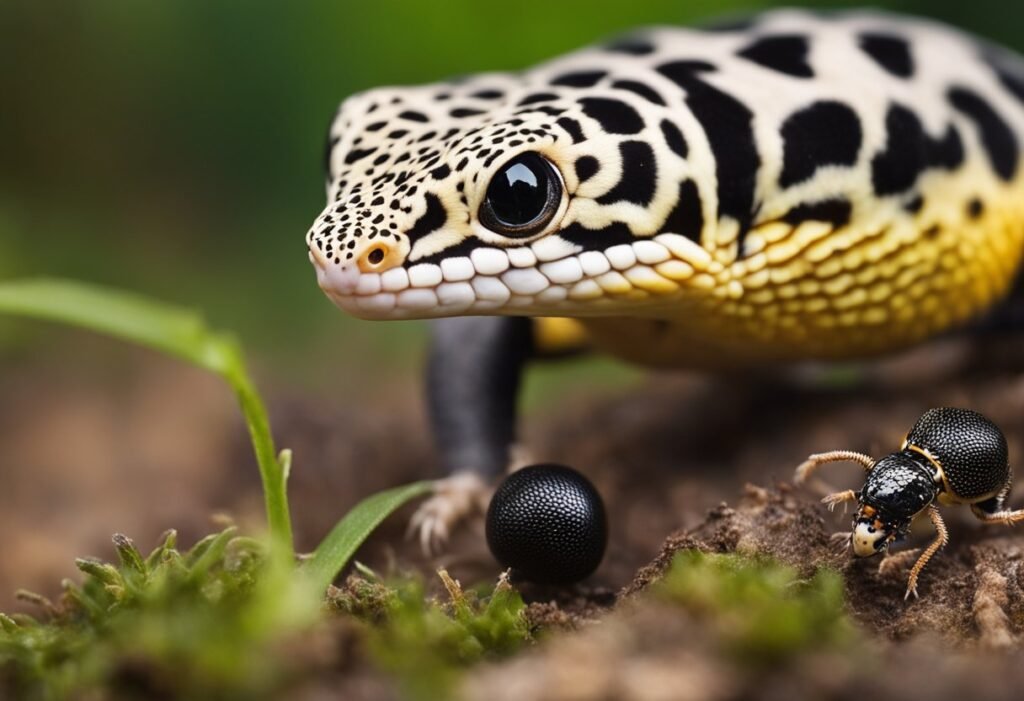
Including darkling beetles in a leopard gecko’s diet can have several benefits. These beetles are a great source of protein and other essential nutrients that are required for the healthy growth and development of leopard geckos.
Here are some of the benefits of including darkling beetles in a leopard gecko’s diet:
- High in protein: Darkling beetles are a great source of protein, which is essential for the growth and repair of tissues in leopard geckos. A diet that is rich in protein can help leopard geckos to grow and develop properly.
- Rich in calcium: Darkling beetles are also a good source of calcium, which is important for the development of strong bones and teeth in leopard geckos. A diet that is deficient in calcium can lead to health problems such as metabolic bone disease.
- Easy to digest: Darkling beetles are easy to digest, which makes them a great addition to a leopard gecko’s diet. They are also low in fat, which helps to prevent obesity and other related health problems.
- Variety in diet: Including darkling beetles in a leopard gecko’s diet can add variety and prevent boredom. A varied diet is important for the overall health and well-being of leopard geckos.
Overall, darkling beetles can be a great addition to a leopard gecko’s diet. They are a good source of protein and other essential nutrients, easy to digest, and can add variety to the diet. However, it is important to ensure that they are fed in moderation, as too much of any one food can lead to health problems.
Potential Risks of Feeding Darkling Beetles to Leopard Geckos
As with any new food item, it is important to consider the potential risks before introducing darkling beetles into your leopard gecko’s diet. While they can be a nutritious and tasty addition, there are a few things to keep in mind.
Risk of Impaction
Darkling beetles are hard-bodied insects that can be difficult for leopard geckos to digest. If they are not properly chewed or broken down, they can cause impaction in the digestive tract. This can lead to serious health issues and even death. To minimize this risk, it is important to ensure that the beetles are small enough for your gecko to handle and that they are not fed too frequently.
Risk of Parasites
Like all insects, darkling beetles can carry parasites such as mites and worms. These parasites can be harmful to your gecko and can also spread to other reptiles in your collection. To minimize this risk, it is important to only feed your gecko captive-bred insects from a reputable source and to avoid collecting insects from the wild.
Risk of Allergic Reactions
Some leopard geckos may be allergic to darkling beetles or other insects. Signs of an allergic reaction can include swelling, redness, and difficulty breathing. If you notice any of these symptoms after feeding your gecko darkling beetles, it is important to discontinue their use and consult with a veterinarian.
Overall, darkling beetles can be a safe and nutritious addition to your leopard gecko’s diet when fed in moderation and with proper precautions. As with any new food item, it is important to monitor your gecko’s health and behavior after feeding to ensure that they are tolerating the new food well.
How to Properly Feed Darkling Beetles to Leopard Geckos
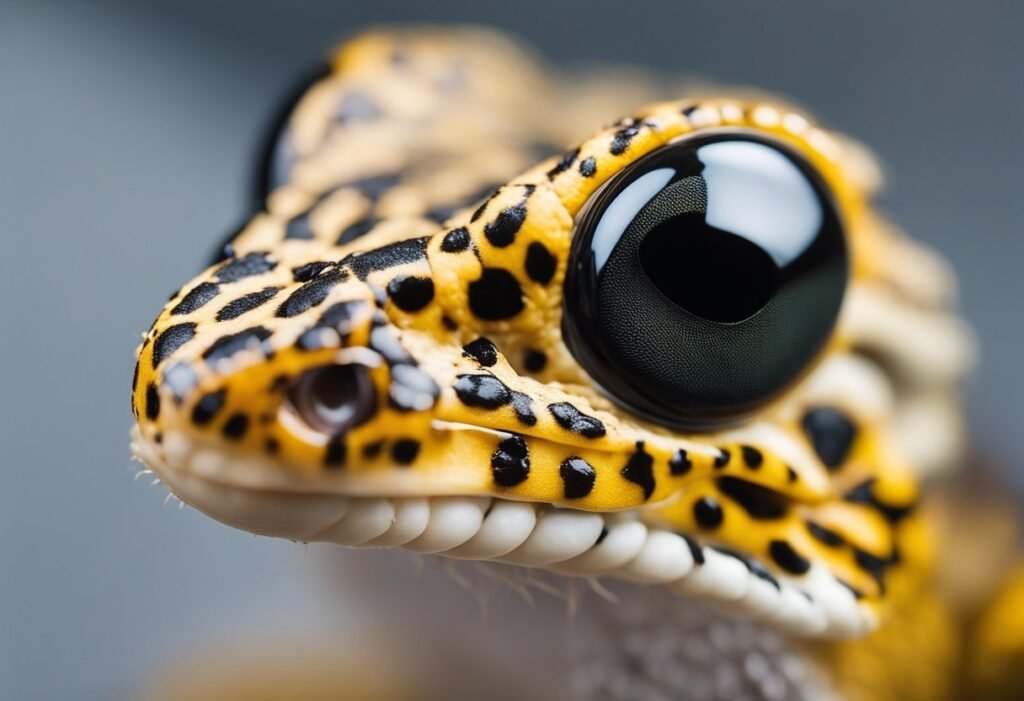
Darkling beetles are a nutritious and tasty treat for leopard geckos. However, it is important to properly prepare and serve them to ensure your gecko’s health and safety. Here are some guidelines to follow when feeding darkling beetles to your leopard gecko.
Preparing Darkling Beetles for Consumption
Before feeding darkling beetles to your leopard gecko, it is important to properly prepare them. Here are the steps to follow:
- Purchase live darkling beetles from a reputable pet store or breeder.
- Place the beetles in a separate container with a substrate such as oats or bran. This will provide them with a source of food and moisture, and prevent them from escaping.
- Keep the container in a warm, dark place for a few days to allow the beetles to clean out their digestive system. This will help prevent impaction in your leopard gecko.
- Remove any dead or sick beetles before feeding them to your leopard gecko.
Appropriate Serving Sizes
When feeding darkling beetles to your leopard gecko, it is important to provide an appropriate serving size. Here are some guidelines to follow:
- For juvenile leopard geckos, feed small beetles that are no larger than the width of their head.
- For adult leopard geckos, feed larger beetles that are no larger than the width of their body.
- Avoid overfeeding your leopard gecko with darkling beetles, as this can lead to obesity and other health problems.
Feeding Frequency Guidelines
The frequency of feeding darkling beetles to your leopard gecko will depend on their age and size. Here are some guidelines to follow:
- For juvenile leopard geckos, feed 2-3 small beetles every other day.
- For adult leopard geckos, feed 3-5 larger beetles every 3-4 days.
- Always provide fresh water and a balanced diet in addition to darkling beetles.
By following these guidelines, you can safely and effectively feed darkling beetles to your leopard gecko. Remember to always monitor your gecko’s health and adjust their diet as needed.
Nutritional Profile of Darkling Beetles
Darkling beetles are a common food source for many reptiles, including leopard geckos. These beetles are high in protein and fat, making them a nutritious addition to a gecko’s diet.
One of the main benefits of feeding darkling beetles to leopard geckos is their high protein content. Protein is essential for growth and development, and is particularly important for young geckos. Darkling beetles are also a good source of fat, which provides energy and helps to maintain healthy skin and scales.
In addition to protein and fat, darkling beetles contain a range of vitamins and minerals. These include calcium, which is important for bone health, and vitamin A, which is essential for eye health and immune function.
It is important to note that while darkling beetles are a nutritious food source, they should not be the sole component of a leopard gecko’s diet. A balanced diet for a gecko should include a variety of insects, such as crickets, mealworms, and waxworms, as well as fresh fruits and vegetables.
Overall, darkling beetles are a healthy and nutritious food option for leopard geckos, and can be a valuable addition to their diet when fed in moderation.
Safe Handling and Storage of Darkling Beetles
When feeding leopard geckos darkling beetles, it is important to handle and store them safely to ensure the health of both the gecko and the beetle. Here are some tips for safe handling and storage of darkling beetles:
Handling Darkling Beetles:
- Always handle darkling beetles gently to avoid injuring them. Rough handling can cause stress and injury, which can lead to health problems for the gecko.
- Avoid touching the beetles with your bare hands, as this can transfer oils and bacteria that can be harmful to the gecko. Instead, use gloves or tongs to handle the beetles.
- Do not handle the beetles immediately after feeding them, as they may regurgitate their food due to stress.
Storing Darkling Beetles:
- Darkling beetles should be kept in a container with adequate ventilation to prevent suffocation. A plastic container with small air holes is ideal for this purpose.
- Store the beetles in a cool, dry place to prevent mold and bacteria growth. A temperature of around 70°F (21°C) is ideal for storage.
- Provide a source of moisture for the beetles, such as a small dish of water or a piece of moistened paper towel. This will help keep them hydrated and healthy.
By following these guidelines, you can ensure that your leopard gecko receives a safe and healthy diet of darkling beetles.
Alternative Insect Foods for Leopard Geckos
When it comes to feeding leopard geckos, it’s important to provide a varied diet to ensure they receive all the necessary nutrients. While crickets and mealworms are commonly used as staple foods, there are several alternative insect options that can be included in their diet.
One such alternative is darkling beetles. These beetles are high in protein and fat, making them a nutritious addition to a leopard gecko’s diet. However, it’s important to note that darkling beetles should not be the sole food source for leopard geckos and should be fed in moderation.
Other alternative insect options include waxworms, superworms, and dubia roaches. Waxworms are high in fat and should be fed sparingly, while superworms are a good source of protein but should also be fed in moderation. Dubia roaches are a great option for leopard geckos as they are high in protein, low in fat, and have a soft exoskeleton that is easy to digest.
It’s important to remember that when introducing new foods to a leopard gecko’s diet, it should be done gradually to avoid digestive issues. Additionally, all insects should be gut-loaded with nutritious foods and dusted with calcium and vitamin supplements before feeding to ensure a balanced diet.
Overall, incorporating a variety of alternative insect foods into a leopard gecko’s diet can provide a range of nutrients and help keep them healthy and happy.
Frequently Asked Questions
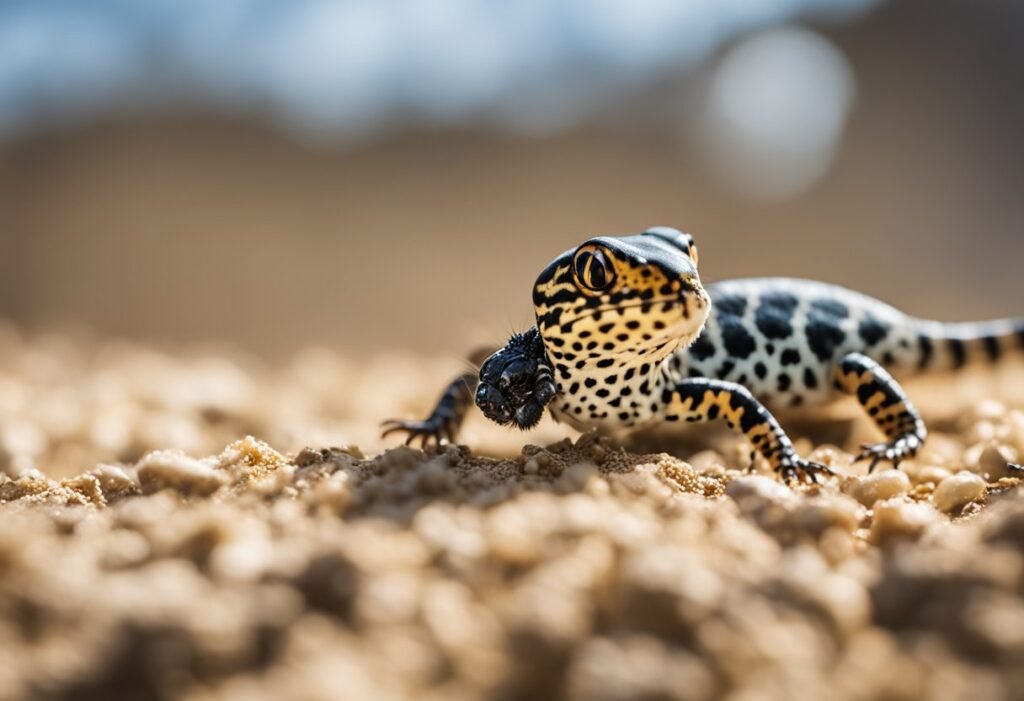
Is it safe for leopard geckos to consume mealworm beetles?
Yes, it is safe for leopard geckos to eat mealworm beetles. However, it is important to note that mealworm beetles have a hard exoskeleton, which can be difficult for leopard geckos to digest. Therefore, it is recommended to only feed mealworm beetles as an occasional treat.
What insects are considered the best diet for leopard geckos?
Leopard geckos are insectivores and require a diet consisting primarily of insects. The best insects to feed leopard geckos are crickets, dubia roaches, and black soldier fly larvae. These insects are high in protein and other essential nutrients that leopard geckos need to thrive.
Can leopard geckos be fed silkworms as part of their diet?
Yes, leopard geckos can be fed silkworms as part of their diet. Silkworms are a good source of protein and are low in fat, making them a healthy addition to a leopard gecko’s diet. However, they should not be the sole source of food for leopard geckos, as they lack some essential nutrients that other insects provide.
Are there any risks in feeding Japanese beetles to leopard geckos?
Yes, there are risks in feeding Japanese beetles to leopard geckos. Japanese beetles are high in fat and low in calcium, which can lead to health problems in leopard geckos if fed regularly. Additionally, Japanese beetles are known to contain toxins that can be harmful to reptiles.
How does the nutritional value of crickets compare to mealworms for leopard geckos?
Crickets are generally considered to be more nutritious than mealworms for leopard geckos. Crickets are high in protein, calcium, and other essential nutrients that leopard geckos need to thrive. Mealworms, on the other hand, are lower in protein and can be difficult for leopard geckos to digest.
What precautions should be taken when feeding beetles to reptiles?
When feeding beetles to reptiles, it is important to ensure that the beetles are not contaminated with pesticides or other harmful chemicals. Additionally, it is recommended to only feed beetles as an occasional treat, as they can be difficult for some reptiles to digest. Finally, it is important to monitor your reptile’s health and behavior after feeding them beetles to ensure that they are not experiencing any adverse effects.

